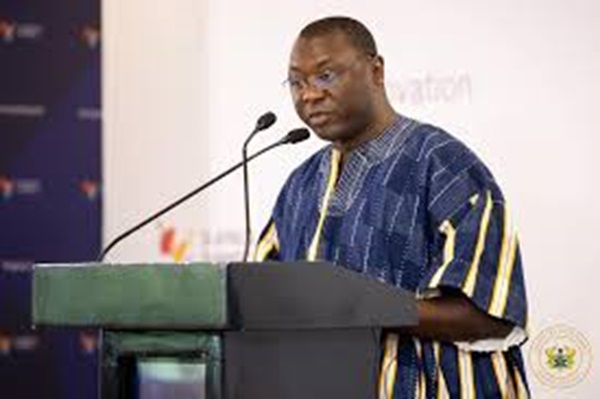
GH¢1.8bn revenue shortfall: Govt falls on foreign income of Ghanaians
The government says it is relying on taxes on the foreign income of resident Ghanaians to close the GH¢1.8 billion revenue gap created by the suspension of the VAT on electricity.
This has become necessary to ensure the government meets its 2024 tax revenue target of GH¢143.1 billion and budget deficit target of 5.9 per cent.
As part of measures to rake in more revenue, the government introduced the 15 per cent VAT on residential electricity consumers, with former Finance Minister, Ken Ofori-Atta in a letter dated January 1, 2024, directing the Electricity Company of Ghana (ECG) and the Northern Electricity Distribution Company (NEDCO) to implement this new tax measure.
However, following stiff opposition from the Trades Union Congress (TUC) and the general public, the government suspended the decision to allow for further engagement with stakeholders.
At the maiden Economic Update series last month, Minister of Finance, Dr Mohammed Amin Adam told the Graphic Business that the suspension of the tax policy would result in a revenue shortfall of GH¢1.8 billion and the government was, therefore, considering alternative measures to pluck the hole.
Responding to another question from the Graphic Business at the joint press conference of the International Monetary Fund (IMF) and the Ministry of Finance, Minister of Finance in Accra last Saturday, Dr Amin Adam said the government had decided to fall on taxes on the foreign income of resident Ghanaians to make up for the revenue shortfall.
He said this was not a new measure but an already existing one which had not been effectively implemented.
“This is a measure that has already been announced in the 2023 and 2024 budgets but has not been effectively implemented but we are now determined to effectively generate the desired revenue to fill in the gap.
“When we take a decision that bothers on the fiscal framework, there are consequences which can be dire unless we are proactive enough to find ways to fill in the gap,” he stated.
Accounts of Ghanaians overseas
It will be recalled that the Ghana Revenue Authority (GRA) recently indicated that it would soon go after accounts of Ghanaians overseas who are not paying taxes after carrying out some work on 70,000 accounts of Ghanaians in 40 countries.
The authority said it was getting information from the Organisation for Economic Co-operation and Development (OECD) Agreement on automatic exchange of information with member countries and the exchange of information on request.
Over 150 countries including Ghana have signed up to this agreement by the OECD, which allows member countries to share information based on request and the automatic sharing of information.
Individuals who fail to meet their tax obligations would be given some time to comply with the GRA, failure to do so results in the application of the necessary penalties.
Economic outlook
Commenting on Ghana's medium-term macroeconomic outlook, Dr Amin Adam said the prospects continued to be positive and promising, with the government maintaining its commitment to implementing comprehensive structural reforms to support growth.
He said the government would also continue to improve the Public Financial Management system, improve revenue mobilisation and support sound monetary and exchange policy.
“We have also put in place sufficient control and monitoring mechanisms to ensure key targets under the IMF-supported programme are met, even though 2024 is an election year,” he stated.
Government commitment
Also speaking at the joint press conference, the IMF Mission Chief to Ghana, Stephane Roudet said the fund’s assessment of the economy was that fiscal performance had been strong, with the country lowering its fiscal primary deficit by over four per cent of GDP and on track to achieve a primary surplus in 2024.
He said the government was spending within the budget, adding that the authorities’ expanded social protection programmes to mitigate the impact of the crisis on the most vulnerable.
Mr Roudet also noted that monetary policy had remained appropriately tight, which allowed inflation to decline rapidly.
“On the external side, there have been significant improvements, particularly international reserves accumulation is ahead of the programme objectives.
“Financial stability has been preserved, with banks posting solid results for 2023, the Ghana Stabilisation Fund has also started its operations and some of the banks are already being recapitalised with the resources from this fund,” he stated.
Changing narrative
For his part, the Governor of the Bank of Ghana, Dr Ernest Addison, said the government was committed to changing the narrative around election-year spending.
“In Ghana’s recent history, we have not been able to successfully implement an IMF-supported programme in an election year without derailment.
“The government and the Central Bank are committed to changing that narrative. We recognise the importance of continued macroeconomic stability and an early return to the capital markets, and we will remain committed to ensure that programme implementation stays firm,” he stated.
He said during the period that the IMF mission was in the country, they addressed some burning issues including the impact of the Domestic Debt Exchange Programme on the balance sheet of the Bank of Ghana.
He said the Bank of Ghana, together with the government has reached a broad understanding on early recapitalisation of the central bank and a Memorandum of Understanding between the Bank of Ghana and the Ministry of Finance would be signed to this effect.